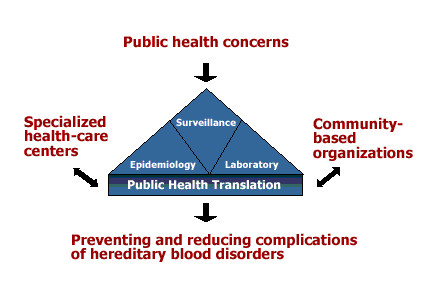 |
The team collaborates with
health-care providers, academic centers, community-based
organizations, and national and international preventive health
agencies to implement specialized prevention programs for persons
with these disorders and their families. A key activity involves
collaborating with networks of specialized health-care centers
throughout the United States.
Currently, the branch has four
key goals:
-
enhance blood safety to prevent the
transmission of infectious diseases to persons being treated with
blood products
-
identify risk factors through
evidence-based research and surveillance and implement interventions
to prevent complications of blood disorders
-
prevent and reduce complications of
bleeding and clotting disorders that specifically affect women's
health
-
develop and deliver consistent
prevention education messages to encourage affected persons to make
informed decisions about their own health care
The Division of Blood Disorders is organized into four
units:
-
The public health translation unit applies the latest
scientific advances from surveillance, epidemiology, and laboratory
support to enhance the delivery of care, prevention services, and
information for the affected populations.
-
The surveillance unit monitors the extent of disease,
the risk factors, and the related complications; conducts field
investigations; and identifies areas for further study. Part of this
unit's monitoring work involves collecting and storing blood samples in a
national repository to use as resource material to facilitate rapid
response to future outbreaks.
-
The epidemiology unit conducts special studies to
better understand risk factors and the means of preventing and reducing
complications.
-
The laboratory unit supports the epidemiologic studies
by identifying new genetic markers of risk factors and clotting defects,
provides reference laboratory diagnosis for multi-site epidemiologic and
surveillance studies, and develops techniques and interpretation methods
to improve molecular and coagulation diagnosis.

|
Disclaimer: Links to non-Federal
organizations found at this site are provided solely as a
service to our users. These links do not constitute an
endorsement of these organizations or their programs by CDC or
the Federal Government, and none should be inferred. CDC is not
responsible for the content of the individual organization
webpages found at these links. |
[Return to top]
Date:June 20, 2006
Content source: National Center on Birth Defects and Developmental
Disabilities
|
 |
|